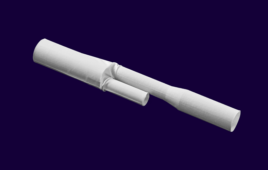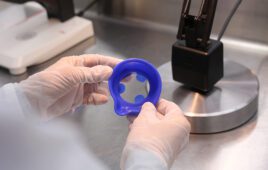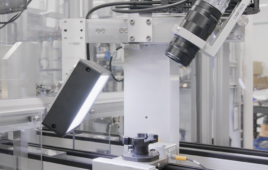 Doty Lazareto is a remarkable engineering professional with a diverse background and a passion for innovation. Born and raised in the Philippines, she developed a strong work ethic and a determination to pursue her dreams. Doty’s journey led her to the United States, where she embarked on a successful career as a Women Field Application Engineer. With over 15 years of experience in new product development and engineered interconnect solutions, Doty has worked across various industries, including aerospace, defense, oil and gas, and industrial applications. Her exceptional skills, adaptability, and problem-solving abilities have made her an invaluable asset to any organization she works with. With her experience and expertise, Doty has been able to successfully develop and implement innovative solutions to complex problems.
Doty Lazareto is a remarkable engineering professional with a diverse background and a passion for innovation. Born and raised in the Philippines, she developed a strong work ethic and a determination to pursue her dreams. Doty’s journey led her to the United States, where she embarked on a successful career as a Women Field Application Engineer. With over 15 years of experience in new product development and engineered interconnect solutions, Doty has worked across various industries, including aerospace, defense, oil and gas, and industrial applications. Her exceptional skills, adaptability, and problem-solving abilities have made her an invaluable asset to any organization she works with. With her experience and expertise, Doty has been able to successfully develop and implement innovative solutions to complex problems.
What initially attracted you to the medtech industry? How has your perspective on the industry evolved over the course of your career?
I was attracted to the MedTech industry for several reasons. Firstly, being passionate about improving people’s quality of lives, I recognized the immense potential of MedTech in revolutionizing healthcare. Secondly, the industry’s focus on innovation and cutting-edge technology appealed to my curious and problem-solving nature. As I progressed in my career, my perspective on the industry evolved. I witnessed the transformative impact of MedTech on patient outcomes, which further fueled my drive to make a difference. Additionally, I realized the importance of collaboration between engineers, healthcare professionals, and patients to develop effective and user-friendly medical solutions. This holistic approach has shaped my vision for future of MedTech.
As a seasoned professional in the industry, how do you envision the future of medtech? What emerging technologies or trends do you believe will have the most significant impact?
As a women engineer, I envision the future of MedTech as a collaborative effort between engineers, health professionals, and patients to develop effective and user-friendly medical solutions. I recognize the transformative impact of MedTech on patient outcomes and is driven to make a difference in improving people’s lives. I believe in the importance of innovation and cutting-edge technology in revolutionizing healthcare. I also want to emphasize the need for diverse experiences and opinions, including women’s voices, in the industry. In terms of emerging connectivity technologies and trends, I believe that the adoption of Blockchain technology can have a significant impact on MedTech by enhancing data security, interoperability, and transparency in healthcare systems.
From your experience, what are some of the key challenges that medtech engineers are likely to face in the coming years? How can professionals in the industry prepare for and navigate these challenges effectively?
As the MedTech industry continues to evolve and bring revolutionary advancements in healthcare, engineers are likely to face a range of connectivity challenges in the coming years. One of these challenges is the shifts towards integrated service solutions, where medical devices and systems need to seamlessly connect and communicate with each other. This requires engineers to develop expertise in connectivity protocols, interoperability standards, and data integration. Additionally, compliance with regulatory standards is crucial to ensure patient safety, and data security. To navigate these challenges effectively, professionals in the industry should stay updated with the latest advancements in connectivity technologies, collaborate with healthcare professionals and patients to understand their needs, and prioritize user-friendly and secure solutions. Continuous learning, interdisciplinary collaboration, and a focus on patient-centered design will be the key in preparing for and overcoming these challenges in the evolving landscape of MedTech. Additionally, they need to be adaptable and open to change as the MedTech industry continues to evolve.
In your opinion, what areas or applications within medtech have the greatest potential for growth and innovation? Why do you consider them promising?
I think there are several connectivity applications within the industry that have great potential for future growth and innovation. One promising area is the seamless connectivity and communication between medical devices and systems. This allows real-time monitoring, efficient data collection and analysis, leading to improved patient care and outcomes. Another promising application is compliance with regulatory standards for patient safety and data security. As the healthcare industry becomes more digitalized, ensuring the privacy and security of patient information is crucial. Additionally, user-friendly, and secure solutions are essential for patient-centered design, enabling individuals to easily access and manage their health data. This connectivity solutions have the potential to improve patient outcomes, streamline healthcare processes, and enhance collaboration, making them highly promising for future growth and innovation in MedTech.
As technology continues to advance rapidly, how do you think medtech engineers can stay ahead of the curve and ensure they are equipped with the necessary skills and knowledge?
I think MedTech engineers can ensure they are equipped with the necessary skills by continuously learning and adapting new technologies. This includes staying updated with the latest advancements, attending the relevant conferences and workshops, and actively participating in professionals’ networks. I also consider the significance of mentorship and knowledge sharing. By finding good mentors and becoming one themselves, MedTech engineers can exchange valuable insights and stay updated on industry trends. I believe that by embracing continuous learning and collaboration, MedTech engineers can stay ahead of the curve and drive innovation in the field.
From a broader perspective, how do you see the role of medtech engineering in shaping the future of healthcare? What impact do you anticipate it will have on patient care and outcomes?
I believe MedTech engineers will have crucial role in shaping the future of healthcare. MedTech engineers have the power to drive innovation and transform patient care. Overall, I anticipate that MedTech engineering will have a transformative impact on patient care, building trust between patients and healthcare systems, and keeping the integrity and confidentiality of patient information. All of these will lead to an improved patient care and outcomes, enhancing the accessibility and quality of critical medical service.
Considering the increasing importance of interdisciplinary collaboration, how do you think medtech engineers can effectively collaborate with professionals from other fields, such as medicine and computer science, to drive innovation in the industry?
I believe that collaboration between MedTech engineers and professionals from other fields is crucial for driving innovation in the industry, particularly in light of the increasing importance of interdisciplinary collaboration. By bringing together the expertise, MedTech engineers can leverage the knowledge and insights of the fields such as Medicine and computer science to develop innovative solutions to improve patient care and outcomes. Lastly as I previously mentioned, continuous learning and staying updated with advancements, as well as mentorship will be a huge beneficial in fostering and driving the innovation within the industry.
How do you think diversity and inclusion can contribute to the advancement of medtech engineering? How do you foster a culture of innovation within your team or organization?
I think diversity and inclusion play a crucial role in advancing MedTech engineering. I recognize the diverse teams bring together a wide range of perspectives, experiences, and expertise, which fosters innovation and creativity. By embracing diversity, MedTech engineering can benefit from multitude of ideas and approaches, leading to the development of groundbreaking solutions in healthcare. To foster a culture of innovation, I encourage open communication, knowledge sharing, and mentorship within teams and organizations. By valuing diverse voices and experiences, MedTech engineering can drive transformative advancements in patient care and outcomes.




